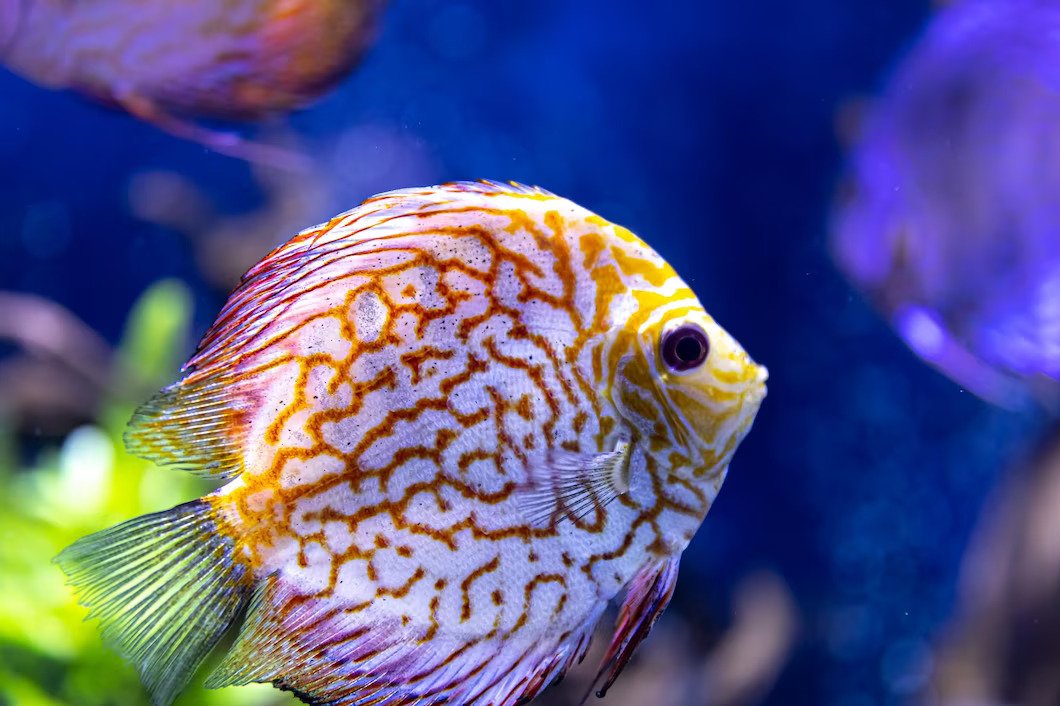Fellow fish enthusiasts! I guess you’re thinking about starting fishkeeping and adding some aquatic charm to your home. I get the feeling. But, if you’re feeling a bit overwhelmed with many fish options out there, let me help narrow it down for you: I highly recommend starting with the Discus fish. Now, you might wonder why they’re often referred to as the “King of the Aquarium,” , here’s why!
Discus fish boast an unrivalled regal charm. Their colors are simply jaw-dropping, ranging from fiery reds and vibrant blues to gentle pastels that can make your eyes pop with delight. Imagine having a living work of art gliding through your tank, it’s a sight to behold.
However, as with any royal treatment, they do require some TLC. In this beginner’s guide, I am going to explore everything you need to know about discus fish and how to take care of them.
Recommended Fish Tanks For Discus Fish
Facts about Discus Fish
| Fact | Description |
|---|---|
| Scientific Name | Symphysodon |
| Native Region | Amazon River Basin |
| Lifespan | 8-10 years |
| Adult Size | 8-10 inches |
| Temperament | Peaceful and social |
| Water Temperature | 82-86°F (28-30°C) |
| Water pH | 6.0 – 7.0 |
| Water Hardness | Soft to slightly hard |
| Feeding Habits | Omnivorous |
| Breeding Behavior | Egg-layers |
| Parental Care | Diligent and protective |
| Compatibility | Peaceful, suitable for community tanks |
| Ideal Tank Size | Prefer larger tanks (at least 50 gallons) |
| Color Varieties | Wide range of vibrant colors and patterns |
| Tank Setup | Planted with hiding spots |
| Maintenance | Regular water changes and clean-up |
| Sensitivity to Water Quality | Sensitive to changes in water parameters |
10 Reasons Why Discus Are Called the King of the Aquarium?


Before we jump into the reasons that make discus fish king of aquarium, here’s a brief fact about discus fish. Discus fish are scientifically known as Symphysodon and belong to the family Cichlidae . They are native to the Amazon River basin in South America. There are three recognized species: Symphysodon aequifasciatus, Symphysodon haraldi, and Symphysodon discus. Discus fish are highly prized for their striking colors and distinctive round shape, resembling a disc. By the way, they can grow up to 8-10 inches in length and have a lifespan of 8-10 years with proper care. Now, here are 10 reasons why they earn that title;
1) High Maintenance
Discus fish love of clean, fresh, and dechlorinated water. Matter of fact- they demand meticulous care, earning their reputation for high maintenance fish. To maintain their optimal environment, a 20% water exchange is necessary daily to ensure pristine water quality and prevent water parameter fluctuations. This is because temperature plays a crucial role in their well-being, as Discus fish originate from the warm waters of the Amazon River. So, you will have to jeep their water at 30°C (86°F) by replicating their natural habitat, promote their metabolism, digestion, and overall health of your royal fish pets.
2) They Feed 3 Times a Day
Do not be surprised that Discus fish feed more than even some humans( No pun intended). Feeding Discus fish three times a day is essential to meet their specific dietary needs. As active and social feeders, regular meals maintain their energy levels and keep them healthy. A well-balanced diet is crucial for their growth and vibrant colors.
Their diet should include high-quality pellets, flakes, and frozen foods like brine shrimp, bloodworms, and daphnia. Knowing this is vital for successful Discus fish care because inadequate nutrition can lead to stunted growth, weakened immune systems, and overall health issues. Proper feeding habits promote their overall well-being and ensure these majestic fish thrive, adding a touch of royalty to your aquarium.
3) Majestic Appearance
From the first sight, discus fish has a royal appearance that fits their title as the “King of the Aquarium.” Think – love at first sight. They have cool-striking colors that range from dazzling reds, mighty blues, and all shades of greens to intricate patterns. Seriously, it’s like having an awe-inspiring spectacle right in your own fish tank!
And you know what’s cool? Just like other beautiful animals, discus fish have become symbols of conservation efforts over the years. When people find them visually appealing, they’re more likely to care and support their preservation especially fish keepers. Plus, their round, disc-like shape adds to their charm. They swim so gracefully, like true underwater royalty, radiating elegance and nobility. Trust me, having these stunning fish will elevate your aquarium game to a whole new level.
4) Graceful Behavior
One of the things that I absolutely love about Discus fish is their graceful behavior. If you’ve ever had the pleasure of keeping Discus fish, you know exactly what I’m talking about. Their smooth and fluid movements, along with their calm and serene demeanour, create this peaceful and majestic vibe in your aquarium. It’s truly beautiful to watch them swim through the water with such grace.
5) Social Intelligence
Now, let me tell you why they’re the kings of aquariums – it’s because of their incredible social intelligence. These little fish are seriously smart! They can recognize their owners and form this special bond with them. Some Discus fish owners have even noticed that their pets respond to them, maybe even enjoying some good tunes or TV time together. No cap- their intelligence and friendly nature make them such endearing companions.
6) Challenging Care Requirements
But, let me be real with you – as much as I adore Discus fish, they do come with a bit of a high-maintenance reputation. Taking care of them requires dedication and attention to detail. They’re pretty sensitive to water quality and temperature, so you have to keep things in check with regular water changes and close monitoring. And their diet? Let’s just say they’ve got specific tastes just as I previously mentioned. But hey, discus are worth it all.
7) Social Hierarchy
Discus fish reign as the “King of the Aquarium” by establishing a captivating social hierarchy within their group. Dominant fish take the lead, displaying commanding behaviors akin to true royalty, creating an engaging and dynamic aquarium environment. But, these all happens in a group. This group behavior fosters enhanced communication and coordination, promoting a sense of community among them and ensuring safety.
8) Parental Care
Another royal quality of Discus fish lies in their exceptional parental care. During breeding, these devoted guardians meticulously tend to their eggs, fanning them with their fins to provide oxygen and safeguarding them from potential threats. After hatching, parents continue nurturing and protecting the fry, ensuring their survival and well-being.
9) Community Compatibility
Furthermore, Discus fish’s compatibility with various other species showcases their kingly prowess. Despite their regal status, these fish are remarkably amiable and peaceful in community setups. Their sociable and non-aggressive nature makes them delightful and approachable companions, enriching the overall aquarium experience with a harmonious and inclusive atmosphere. In this aquatic realm, Discus fish reign as true kings, ruling over an aquarium teeming with diverse aquatic life.
10) They are Peaceful
Discus fish are so calm, and peaceful. They are a perfect choice for both home or community aquariums. When compared to some fish species that are not as peaceful such as Tiger Barbs, Betta fish that pose challenges in community setups due to their combative tendencies, discus fish are the best recommendation. If you want to maintain a peaceful fish habitant, then careful consideration of fish compatibility is crucial to maintaining a peaceful and harmonious aquarium.
Best Glass Fish Tank for Discus Fish( SeaClear 50 gal Acrylic Aquarium Combo Set, 36 by 15 by 20″, Black)


The Breeding Behavior of Discus Fish
Male and female Discus fish have distinct differences in appearance and behavior. Males discus have a larger and more elongated body compared to females. They develop a noticeable forehead hump as they mature, which is absent in females. Behaviour wise, males often display more intense and vibrant colors, especially during courtship and breeding periods while females have a rounder and fuller body shape, and their colors are usually less striking than the males.
You can notice this behaviour during courtship as males become more territorial and may exhibit more aggressive displays to impress and attract females. To determine the sex of Discus fish, you can observe their physical characteristics . Males’ humps become more pronounced as they age, making them distinguishable from females.
Also, during courtship, males may display more vibrant colors and engage in courting behaviors, like chasing and dancing. In contrast, females may exhibit more submissive behavior during this period. However, it is essential to note that accurately sexing Discus fish can be challenging, especially in young or immature individuals.
Now, Let’s Delve Into the Fascinating Breeding Behavior of Discus Fish.
When a pair forms, they select a suitable spawning site, such as a flat surface or a broad leaf. The female then lays adhesive eggs on the chosen surface, while the male follows to fertilize them. Both parents take on parental care duties, diligently fanning the eggs to provide oxygen and ensure cleanliness. They fiercely guard the eggs from potential threats. After 2-3 days, the eggs hatch, and the fry remain attached to the spawning site for 4-5 days, nourishing themselves through their yolk sac.
Once the yolk sac is absorbed, the fry become free-swimming, and the parents continue to guide and protect them, assisting in finding food. Eventually, as the fry grow more independent, the parents may lose interest in guarding them. At this stage, it is essential to remove the fry from the parents’ tank to prevent predation. Successfully raising the fry requires careful attention to their diet, maintaining stable water conditions, and regular water changes. Breeding Discus fish can be a rewarding experience, but it requires dedication and knowledge to ensure the well-being and survival of the fry. Understanding their behavior and providing the necessary care are key to a successful breeding journey.
In the context of fish, “fry” refers to the newly hatched fish larvae. It is the early life stage of fish, following the hatching of their eggs. Fry are typically very small and delicate, and they rely on their yolk sacs for nourishment during the initial days after hatching. As they grow, they become more independent and start feeding on their own, gradually developing into juvenile fish. The term “fry” is commonly used in the fishkeeping and aquaculture communities when discussing the early stages of fish development( Source).
How Does Discus Feed?


Discus fish are omnivorous, meaning they consume both plant-based and animal-based foods. In their natural habitat, they primarily feed on small aquatic insects, worms, crustaceans, and plant matter.
What to Feed Discus?
In captivity, it’s essential to provide a well-balanced diet to maintain their health and vibrant colors. High-quality commercial pellets or flakes formulated specifically for Discus fish are readily available and serve as a good staple food. Additionally, supplement their diet with frozen or live foods like bloodworms, brine shrimp, daphnia, and chopped earthworms to mimic their natural diet.
Feeding Frequency and Quantity
Discus fish should be fed multiple times a day to meet their nutritional needs. A good feeding schedule is to offer small meals around 3-4 times a day. Feed them as much as they can consume within 2-5 minutes during each feeding session. Overfeeding can lead to water quality issues, so it’s crucial to monitor their intake and avoid leaving uneaten food in the tank. Remember, each discus fish can have different appetites, so it’s essential to observe their behavior and adjust the feeding amount accordingly. Providing a varied and balanced diet will help keep your Discus fish healthy, happy, and thriving.
Should I Opt for a Glass or Acrylic Aquarium for Your Discus Fish?
If you want to start keeping Discus fish, a glass aquarium is a better choice( I recommend these Top 10 Best Glass Aquariums) for a number of reasons;
- Glass has a way better scratch-resistant surface. You will also get a providing a clearer view of your fish without the risk of hazing or distortion over time, which can occur with acrylic material.
- When it comes to yellowing over time, glass tanks are less susceptible to discoloration and deterioration from exposure to light and heat. This ensures a long-lasting and aesthetically pleasing display.
- Budget wise, glass aquariums are generally more affordable than acrylic tanks, making them a cost-effective option.
- Finally, glass is less prone to bending or bowing under pressure, providing a more stable environment for your Discus fish.
In conclusion, a glass aquarium is the superior choice for your Discus fish due to its durability, clarity, and cost-effectiveness.
What Is the Ideal Tank Size in Gallons for a Discus Fish Aquarium?
The recommended tank size for discus fish is at least 50 gallons , you can more. This is because of these factors;
- Space and Comfort: Discus fish are known for their graceful swimming and active behavior. A larger tank provides more swimming space, allowing them to exhibit their natural behaviors comfortably.
- Temperature and Stability: Discus fish prefer warmer water temperatures (82-86°F or 28-30°C). In a larger tank, it’s easier to maintain a stable and consistent temperature throughout the tank.
- Plant and Decorations: Discus fish enjoy having hiding spots and plants in their environment. A larger tank allows for more room to incorporate plants and decorations, which can reduce stress and make the fish feel secure.
Conclusion
You can keep all kinds of fish. But, if you want to keep discus fish then you must be ready for the challenge. Discus fish are high maintenance, like their water temperature at 82-86°F or 28-30°C) and feed a lot ( at least 3-4 times a day). All in all, they are a work of art and are a beautiful addition to any aquarium. Go for it !
SOURCES
- Aqueon: Discus Fish
- kavemanaquatics: Top 3 Discus Food to Get Them to Eat (Picky Eaters Edition)
- Acrylicpedia: Acrylic Vs Glass Aquariums- Which is Best?






